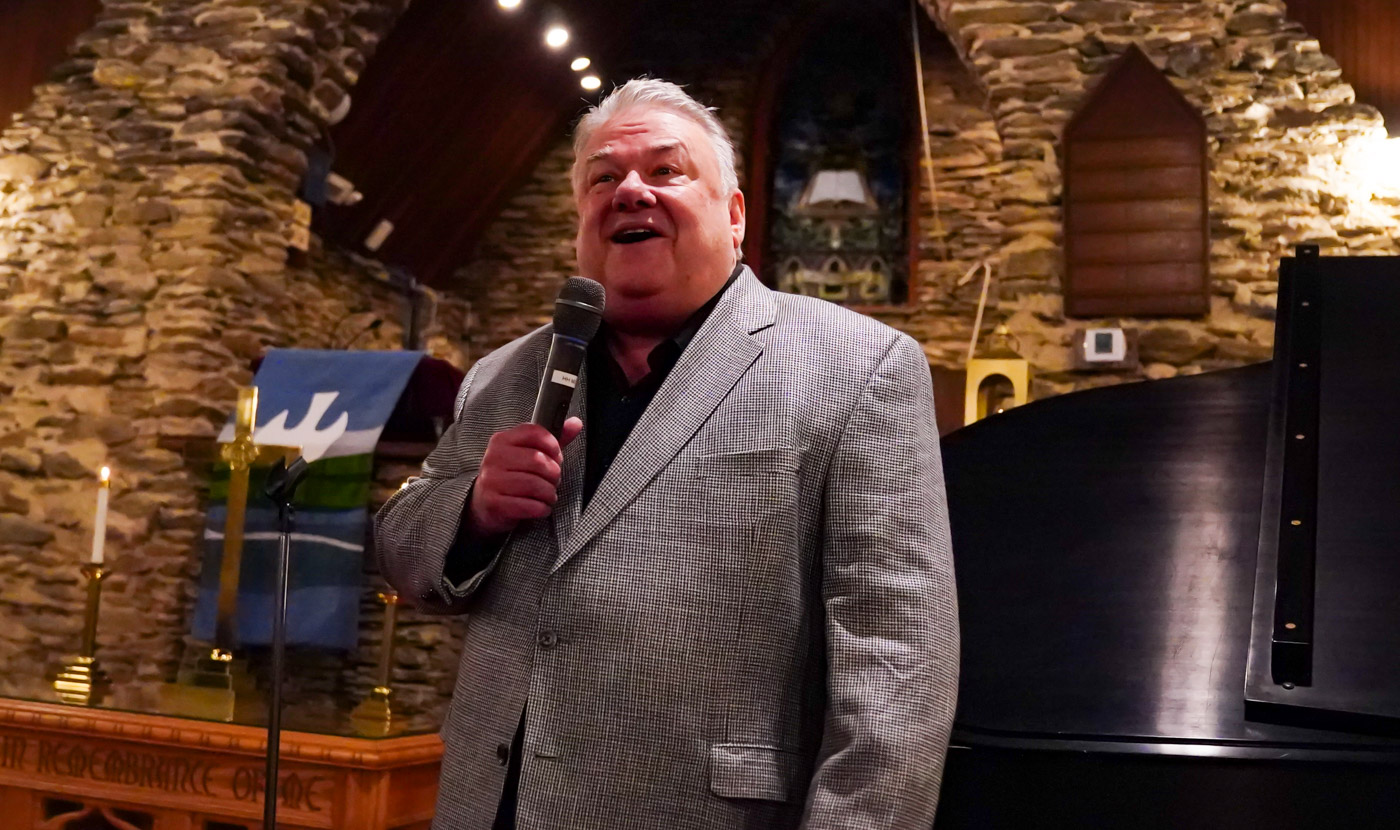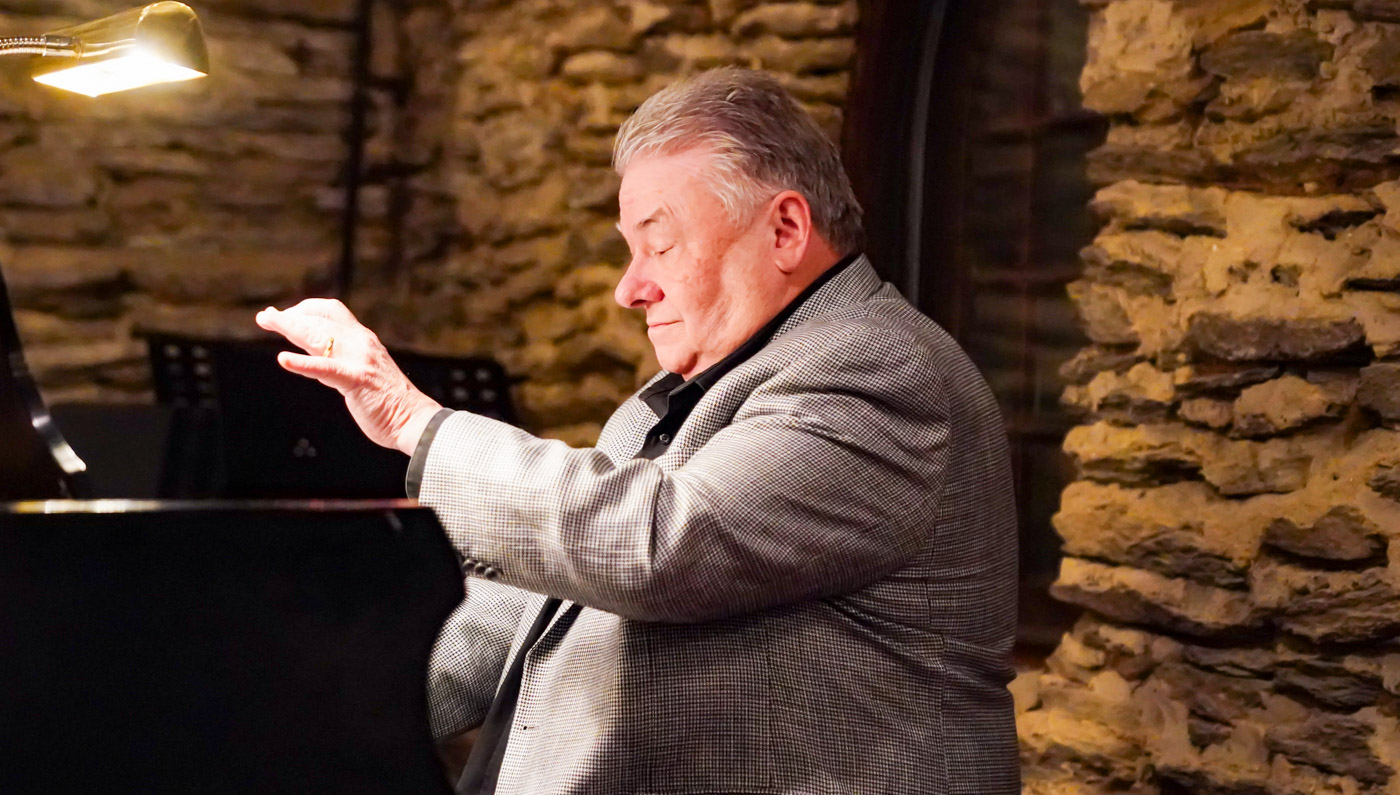By David Rogers. BLOWING ROCK, N.C. — Some people may have thought the baby grand piano at the front of the Rumple Memorial Presbyterian Church sanctuary had limitations. In the hands, fingers and pedal-tapping feet of Joseph Martin on Nov. 9, there were apparently no limits at all.
Martin, the award-winning composer and lyricist now lives in Austin, Texas, but was born and raised in Rutherfordton, N.C. He performed at the invitation of church leadership for Rumple’s “Composer Workshop Series.”
With a Bachelor of Music from Furman University and a Master of Music degree from the University of Texas, Austin — both degrees in Piano Performance — you might guess Martin was talented, but at times it sounded like six people running their hands across the keyboard all at once, beautifully in synch and harmony.
“I get paid by the note,” quipped Martin after his opening number of the Saturday night concert. And you could almost see all those notes flying around Rumple’s inner sanctum.
Before the concert for which all were invited to come, free of charge, Martin worked with the Rumple sanctuary choir, tweaking five anthems they performed during Sunday’s worship service.

Rumple’s senior pastor, the Rev. Kathy Beach, was quick to credit music director Dave McCollum for the “Composer Workshop Series.” McCollum articulated the thoughts behind his brainchild.
“This series started with the traditional hymns we sing as a gathered congregation and how a composer or arranger expands them and changes them to a presentation that a choir might perform,” explained McCollum. “A lot of times, we may like the finished works but we don’t know what the composer or arranger was thinking about the hymns when they were re-working them. Having the composer here provides us with context for the work we are performing.”
An opportunity to expose his choir and the church community to Martin was something that couldn’t be passed up.
“Specifically, with Joseph Martin, he is so talented not just with the music but in the lyrics, too,” said McCollum. “Joe has been around such a diverse body of experiences, all denominations, all kinds of different settings,” added McCollum, “He gets inspired then writes his texts based on those experiences. He is in a unique spot because of the diversity of experiences to express music and lyric, not just one or the other. That is a special talent and that’s why I chose him. He is at the very top of this game.”
Getting to know Joseph Martin
Martin taught for five years in the Piano Pedagogy Department at the University of Texas. Earlier, while at Furman, he was accompanist for choral director and composer Milburn Price and, inspired by Price’s teaching, Martin began to compose.
It has been a fulfilling career endeavor. At this writing, he has had more than 2,700 songs published, which is mind-boggling enough for most people to think about — but there are more, too.
“I write just about every day,” Martin told Blowing Rock News during a quiet moment alone on Nov. 10. “I won’t live long enough to see all of the more than 10,000 songs that I have written get published.”
I just look and listen — and there is a song to write, everywhere. It is how I translate my life. I see things and they become music.
You might say art and creativity are in his DNA, but developed a little differently in him. Where other members of his family are talented painters, Martin’s mother says that when he was three years old Martin climbed up on a piano bench and started banging out all of the church hymns he had heard in a Sunday worship service.
“I don’t remember that at three years old but my mother has never lied to me,” he said, before adding with a wry smile, “except about Santa Claus and the Easter bunny!”
For fear of crushing children’s hopes, dreams, and imaginations, Martin didn’t elaborate on his mother’s “lies.”
“My mother said I really never jumped off the piano bench once I got up there. I started formally studying music at five years old, sitting next to her, learning to play duets out of the old Broadman hymnals, some of the old standards, and some of her classical music. She was an accomplished pianist as well as an artist. My brother and grandfather were also artists. In my lineage, there are sculptors and other creative types. I got the sonic version of the DNA!” he chuckled.

The idea of performance is also in Martin’s genetic makeup.
“My father was in radio. He owned a radio station in Spindale, which is another little town near Rutherfordton. He also owned a station in Gastonia. Radio was his first love. He had a golden voice, a beautiful speaking voice, which helped make him an effective minister, pastor and orator,” said Martin. “I really learned a lot listening to his sermons. It was a good childhood.”
Finding music has never been difficult for Martin.
“I just look and there is a song to write, everywhere,” he said. “It is how I translate my life. I see things, and they become music. Other people might look at things more visually. Some people are more tactile, liking to make things, physical things. My wife will tell you there are only a couple of things that I can do. That’s music, but I also like to write words. I journal my journey of faith by writing lyrics and poems. I just finished writing my sixth children’s book and my mother is doing all of the illustrations. Did I tell you she is a fabulous artist?”
Martin credited his love of music and the spoken word with why he is so vested in choral music.
“Choral music is at the intersection of music and message,” he said. “That is such an enjoyable place to live.”
Gaining inspiration through experience
Living in that intersection space is purposeful for Martin because of the many different experiences he has had around the world and the music-based experiential learning allows him to create. While a good bit of his work may be differing arrangements of more traditional hymns, many are original songs borne of his experiences.
Martin recalled for the Rumple sanctuary choir on Saturday an invitation he once received to work in The Cayman Islands.
“I fell in love with how the people worshiped God in their own style and their own style of music,” said Martin. “I went to a service there that was on the beach and there was a baptism. That was the trigger for my song, ‘Come to the Water,’ which has a gentle Islands feel.”
Martin also shared how he was commissioned to write an anthem for Kirkwood, Missouri, to be performed on the anniversary of the tragic mass murder shootings that took the lives of five city officials, a police sergeant, and critically wounded the city’s mayor.
My little dots and dashes are not just a reflection of my own personal journey, but of the things that are around me at any given moment in time.
“I was struggling with this one,” Martin admitted. “Then I was in Stroudsburg, Pa., staying at a budget hotel. When I got to my room, the curtains were open and I looked out onto a graveyard and a large trash bin, filled with garbage. It wasn’t something I really wanted to see so I quickly closed the curtains. The next morning, I woke up to what had been a generous snowfall. I opened those curtains and you couldn’t tell it was a graveyard and the trash bin was all covered with white snow. That moment triggered the inspiration for ‘Canticle of Peace.'”
“Canticle of Peace” incorporates Martin’s original poetry with traditional text and music from “Agnus Dei,” a collection of Christian liturgies as well as text that appears in Antonio Vivaldi’s “Gloria.” It all adds up to an inspiring and moving anthem under Martin’s hand.
To me, those spirituals are ministry, they are artistry and they are history… Out of this terrible experience bloomed these beautiful, hopeful messages. It stops me in my tracks.
“I love all styles of music,” Martin noted in the interview with Blowing Rock News. “I know they call them worship wars and culture wars, but I get to travel the world and I just absorb all of that music. As a composer, you pull from those experiences for your own compositions. My little dots and dashes are not just a reflection of my own personal journey, but of the things that are around me at any given moment in time. In the case of ‘Come to the Water,’ I actually wrote it or got the ‘vibe’ of it by witnessing the joy of the worship services and the authenticity of their faith expression. I really enjoy writing in different styles, from Gospel to Celtic music. Several of my Christmas cantatas take you on a travelogue of sorts around the world. Listening to others has kept me interested and growing as a musician.”
History matters
The music of Christianity is inspired, too, and Martin is a student of it.
“When you think about it, it is history and it is ministry… In studying the history of Western music one must first study the history of the Christian church. That is where a lot of our melodic syntax came out of phrasings. Of course it began to amalgamate and change. It has grown to be a wonderful variety now,” said Martin.
What we came to know as Negro spirituals are a good example of inspiration and variety.
“To me, those spirituals are ministry, they are artistry and they are history. And if you can take all three things about those spirituals and understand that out of this terrible experience (of slavery) bloomed these beautiful, hopeful messages… It just stops me in my tracks.
“If I ever get to heaven, and I know that I will,” Martin continued, “I want to talk to the man or woman who wrote the Negro spiritual, ‘Give me Jesus.’ To me, that is just the most perfect song. It is so succinct and so perfectly fashioned. It is artful and it is authentically sincere. I strive for those things in my own music but when confronted with that kind of masterpiece I realize I have a ways to go. I have to get up the next morning and try again.”
Martin has a lot of product.
On becoming a pseudonym factory
According to his publishers, he said, Joseph Martin writes too much music for the marketplace so they have asked him to write under different names. Now, in addition to his own name, he publishes under a total of 10 “nom de plumes,” including nine different pen names.
“It is kind of fun because I will be in a conference and hear one of my pieces and nobody knows I am the guy that wrote it! I just sit there and have this little secret, laughing,” said Martin.
The prolific music composer and arranger explained that what distinguishes each pseudonym is either style or function.
“One of them is an a cappella composer, Joseph Graham. The pen names are usually family names that I just combine in honor of nephews and grandmothers, and other relatives. At least I hope it is an honor!,” he said smiling.
So nothing to do with Billy Graham?
“No, but that is something I suppose I could have done! Actually, I have a nephew named Graham,” he explained. “I liked the way it sounded and it looked good on the page, so…”
Martin further explained that other pseudonyms are stylistic, like “Michael Barrett.” He writes more contemporary. It is more rhythmic. Another writer is a composer and arranger of pop tunes for the school and community chorus markets. So not all of them are sacred music.
“Those are things that the publishers wanted me to do to help them market the product.”
And Martin has a lot of product.
“There are a lot of things that I can’t do, but one thing I couldn’t do is stop writing. I write every day. I have about 10,000 finished songs and I will never live long enough to see them all in print. For me, it is more of a ritual or spiritual discipline to chronicle my life through song. Sometimes it’s words. Sometimes it’s music. Sometimes it’s both,” said Martin. “There are triggers every day. So those nom de plumes have helped me be more present in more sanctuaries. Not every church is the same. Not every denomination is the same — and I want to be useful.”
So Martin really has 10 brands, similar to a company that owns a variety of different style restaurants, from high end to low end, from tacos and pizzas to steak.
“Almost every industry has experienced that kind of diversity, in one way or another,” he said.

Pursuing perfection?
Martin shared a valuable nugget his father offered when the young musician was practicing eight, nine, ten hours a day.
“‘Joe, don’t try to be perfect. Just don’t let them outwork you and you will be fine,’ my father said,” Martin said.
“But there is also a secret,” the pragmatist said. “There is a reason they call it ‘playing’ the piano and not ‘working’ the piano. I so love it. If I won the lottery tomorrow my life would change very little except I might live life in a much better car! Truthfully, I cannot imagine not doing the life I have been doing for the last 30 years. It brings me joy. It animates me. It brings me life.”
Already prolific, Martin just finished cantata No. 70, but was asked about what was behind his writing and composing of “Joseph’s Song” found in one of his earlier cantatas, “The Voices of Christmas,” released in 2004.
“You are always looking for new ways to tell the old, old story,” explained Martin. “It is hard because the story of Jesus’ birth and emergence as the Messiah doesn’t change. But as a composer, you can move around inside the story and your perspective can change. You can see new things and there are new lessons to be learned no matter how many times you have read or heard the story.
Sometimes it is just a very special revelation that you really don’t feel privileged to be the caretaker of. Once you put it down on paper, you feel at rest.
“In that particular piece,” added Martin, “with the writer I was working with at the time, we were discussing how Joseph never gets a song. It seems like we go from Mary to the shepherds, who get to dance and have fun and fellowship with angels. Then there are the three wise men.
“But there is this faithful man in the background which is a movie in itself, in my opinion.” Martin continued. “But the idea of a carpenter and not knowing all of these miracles that were happening in his life and how to respond to them. To show his humbleness and his inability to disparage Mary’s dreams, the angels and all of that, and to realize that all he can do his teach his son to hold and use a hammer and nails… Of course, on this side of the crucifixion we know how sad that is, the irony of what Joseph could teach vs. how his son’s death came about. It does take your breath away when you think about the irony.”
Writing music is often an emotional journey for Martin, who is quick to laugh and crack a joke, often involving a word’s double meaning.
“I cry, too,” he admitted. “It is not my truth I am sharing (in these songs). Sometimes it is just a very special revelation that you really don’t feel privileged to be the caretaker of. Once you put it down (on paper), you feel at rest. You find peace in that thought being shared.”
Inspiration can come from the smallest and simplest of places, including from a picnic with his wife and kids.
“When I was writing my cantata, ‘A Winter Rose,’ I was walking through a rose garden in Austin, with my kids running around,” Marin recalled. “I saw this beautiful garden with the roses fully blooming and I had the revelation, ‘The rose died for its thorns.’ And I thought of Jesus and his thorns. The song is ‘The Rose of Sharon.’ He died to release the fragrance of grace to the rest of the world. I scrambled for my notepad. I didn’t have an iPhone back then. I started talking about how roses are like our faith and so much like Jesus.”
Listening to others has kept me interested and growing in music.
Martin reflected on how Shakespeare used roses in his writing and noted that some churches use roses when they perform the cantata.
“It comes to the moment where you plant the rose on the hill, far away. And I have seen performances where a little child walks up to a rose on the alter and pulls each little petal off and toss them on the alter as the song is being sung,” he recalled. “The same imagery like Disney’s Beauty and the Beast, when the petals were falling off the roses. Roses have been a universal symbol and it is great for the sanctuary as well.”
Martin’s pre-Thanksgiving activities are only just picking up steam with his early November appearance at Rumple.
“In two weeks, we will be in Carnegie Hall, in New York City, for the presentation of one of my cantatas. It is one I wrote during COVID-19 called, ‘The Weary World Rejoices.’ My wife, Sue, will be there doing solos and I will have 200 voices in the choir and a giant orchestra. So that is going to be a mountaintop experience. I love the idea of turning Carnegie Hall into a cathedral for a night. It will be a magnificent evening, I know.”
Magnificent is among the words used to describe Martin’s weekend in Blowing Rock, at Rumple, said senior pastor Kathy Beach.
“Clearly, from this experience, it is not just a wonderful thing for the choir but for the entire congregation and the larger community who participated. To have a composer here, the impact on the choir is remarkable to see how amazing the anthems sounded and how enthusiastic the choir members were to work with someone like that. He has such an incredible gift. Everyone who left worship this morning said this was just what they needed and wanted today. It was an amazing experience for the congregation and for the community members who attended today and were at last night’s concert.”





